
How Concert Ticket Payment Platforms Handle Complex Revenue Splits
Concert ticketing revenue involves complex payment splits among multiple stakeholders. Understanding how these splits work is crucial for effective payment processing and financial management in the live music industry.

Concert orchestra performing with choir onstage
Revenue Distribution Breakdown:
- Artists earn from initial ticket sales and merchandise
- Promoters receive a portion of initial ticket value
- Venues collect from ticket fees, parking, food, and alcohol sales
- Merchandisers profit solely from merchandise sales
- Ticketing providers earn a percentage of ticket fees

Concert revenue distribution and payment flow
Modern Payment Solutions:
- Automated distribution based on predetermined contracts
- Real-time transaction tracking and splitting
- Unified system for all revenue streams
- Integrated merchandise, food, parking, and ticketing sales
Compliance Requirements:
- Anti-money laundering screening
- Tax compliance across 190 countries
- Automated tax form collection and validation
- Risk-based transaction monitoring
- Screening against international blacklists
- Real-time data verification
- Role-based access controls
- Comprehensive audit trails
Payment infrastructure systems now automate these complex distributions, reducing manual processing and ensuring accurate, compliant payouts to all parties involved. The right payment platform should handle multi-party splits while maintaining regulatory compliance and providing transparent tracking of all transactions.
Related Articles

SXSW 2026 Gets Shorter Format, But Expands Music Festival Lineup

